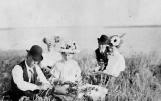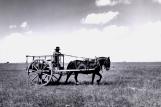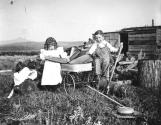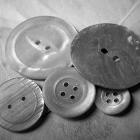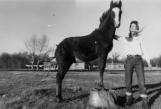2
And did you have any neighbours?Oh yeah, lots of neighbours. We used to have ball games and everything at night, you know with the neighbours. Everybody socialized then eh? Like now, nobody, now nobody, like you don't hardly know your neighbours now. It's different--different world altogether. But when we were kids, all the neighbours would gather, somebody's place, we'd have a ball game, and then every year we'd have picnics and stuff. They'd go around in the morning and collect cream from different farmers, so much from each farmer, would donate so much cream, and they'd get them old ice cream freezers and crank em and make ice cream and the kids could have all the ice cream they wanted. That was ice cream, that wasn't this stuff they got nowadays.
4
One day I was home, I guess I was about 10 years old, and this man and his wife came into our yard, we lived on the home farm then, and Number Two Highway run right by our place, and he was going down the highway with this team and hay rack, and he had a cow tied behind, and he had all his belongings on the hay rack, and he came in to see if he could water his animals, and I was home alone, Dad and my brothers was all away that day, it was on a Sunday, and he asked me if he could have some water, and I said, 'sure take all the water you want', cause we had lots of water in our well, eh. So he watered his horse, horses, and he watered his cow, and he took some in a can, I think, for drinking. And when, when he was leaving, he said 'how much do I owe ya?' And of course being a kid, I was dumbfounded, I said 'Owe me? What would you owe me for?' And he said, 'for the water'. And I said, 'we don't charge nothing for water, we got lots of water.' And 'Oh!' he says, 'the last place I was at, they sold me two pails for a nickel.'5
The signal for supper1915
Assiniboine River, Winnipeg, Manitoba, Canada
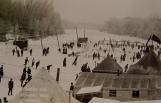 Credits:
Credits:Image courtesy of: Archives of Manitoba, Sport-Skating 10, N20777
6
I think every child that lived out here, ah, entertained themselves. We would, we would go to the corner - our families, our parents would call us for supper, you know? You would always hear somebody out calling their child for supper. And so that was usually the signal. If somebody was called for supper the rest of us should really be going. Find out what's, you know, maybe it's time for us to eat. And then we would say "Okay we'll meet; we'll meet at the telephone pole after supper". And we did. And we would have ah, we would play games. We would play hide and seek, we would play draw-a-snake-upon-your-back-and, you know, -who-poked-it, and that kind of thing. And the older kids looked after the younger kids. I didn't have older brothers and sisters, so I was that generation that they, they kind of took care of me. And then there was the generation younger than me that didn't, you know, didn't come out to play after supper. But we would play games and we had to entertain ourselves. We didn't have television. And we didn't have organized sports. Ah, some of the older boys would get to play hockey at Sturgeon Creek Community Club. There's a, there's a thing. The old community club, there was an old club house, and there were two or three boxcars. And the boxcars had potbellied stoves in them. Or barrelled stoves, maybe not pot bellied, but barrelled. And then we'd get those things going and the older guys they would… the the the stoves would be red. And then they'd put their mitts on them to dry 'em, you know? That was an experience and then of course the skating rink was there.8
East...east thirteen, that was our phone number. So you can imagine how many phone numbers there was. And we were lucky to have our phone.And then there was the water, we got the water in the house. And the next door neighbour in this house--well, it's not this house cause they tore it down--Mr. Hooper used to come every night for water. He got water from my mom and dad's for I guess, ten or twelve years.
Oh wow.
Yes, so it was a different altogether, than it is now where you turn the tap on and you got water.
Could you tell me the story about you getting water when you were a kid and how that...
Oh yeah, up the, we used to go up the wooden sidewalk with my brother Frank, that's John's father, and it was a wooden sidewalk. And we would clippity-clip up and we had a wagon with two large, it was a wagon my dad made cause being a blacksmith he could make a wagon, it was made out of oak, if you can figure pulling an oak wagon and two barrels of water.
Wow.
And we would take the key and go up to Ness, and turn the key. I'd get a ride up there cause there was no water, I'd get a ride up and then we'd, we'd...unlock the water, cause you couldn't have the water unless you paid your taxes. And so we would get the water and then we'd come down the street again, which clippity-clop. And it would spill part of the water and when we would get there my mom would say, 'you haven't got enough! It's half gone.' So we had to come back and get some more. But my brother used to take me up on the wagon and in, on the sleigh in the winter time. On the sleigh we went the same route and come back. But then we got cement sidewalks, not long after that we got cement sidewalks in a couple years. And we go up and no trouble--we'd go up maybe twice a day.
And you wouldn't spill as much water.
No, you wouldn't spill as much water. But you see and then when the wintertime come, and it was a good winter, by that I mean lots of snow, and fresh snow a lot. Then we would fill the tubs with fresh snow and my mother would use that for bathing us, or for washing clothes or anything like that. And she'd put them on a...see we had a cookstove, we didn't have an electric stove for a long time, we had a cook stove. She would put the pots on there and it would melt and then if you wanted a bath, it was already hot from the cookstove. And you would have a bath and most times we bathed in the tub, it was a big tub. And it wouldn't be just fresh water for everybody, you'd, the next guy would get in and he would have his bath. And that's the way we did, that's the way we worked. It's history, it's very good history of what went on in those days. And the kids nowadays would think we were drunk if we were telling them this.
10
Well I was very little, I would...use the age 5 for a lot of my stories just because that's about when I think a lot of things happened. Ah, the knock came on the door and this fellow that was there ah, when my mom answered it was, had a sock cap on and he had gloves without, with bare fingers and he looked very poor. His clothes were grubby, not to clean, a little unshaven. And ah, he was selling threads and bobbins and whatever - thimbles. I don't know about bobbins, but thimbles, and mom gave him some money and, I think he even had buttons. So mom gave him some money and ah after he'd gone I asked mom, you know, why he looked so sad. And she said I guess because he's poor and maybe he's unhappy. And so anyway, I asked if I could give him ah some money too, so she gave me some change and I went racing through the prairie grass after him to, to give him this change and he turned and looked at me and I think that made quite an impression. You know he thanked me very graciously - made quite an impression on me being little. And gave me, when I looked ah, later on, when I looked back to what I might like to do in life, realized that that, that was the beginning of me wanting to ah give to people.12
And one of them was: he came home from work, he looked tired and, I said "Dad, can I go horseback riding?" And, ah so he fished in his pocket and he said, "Well how much is it?" And I said, "A dollar fifty." And he said, "Well, I only have eighty-five cents". And I said "Well, it's seventy-five cents for half an hour, and I can buy a coke with the ten cents." So he gave me it. And another thing he used to do was, when we had moved away, is we used to drive down to see my brother in North Dakota University and ah, there were people that had horses along the way. And I say "Can we stop?! Can we stop?!" And I was twelve, I wasn't, you know, even little. And we pulled into two different American farmsteads. And both those people got out a saddle and bridle and saddled and bridled - one was a pony and the other was a horse. And they said come back anytime and they let me ride. One fellow took me out for an hour on the pony, said how would you like to break the pony? But I think, you know, one of the wonderful things was that my dad had the nerve to go where he didn't know the people and say my daughter's just wondering if she can look at your horses, she loves horses. And if he hadn't taken that step then I wouldn't have had a chance to do that.Yeah.
Yeah, and it taught me something about people too and I always liked Americans after that.
